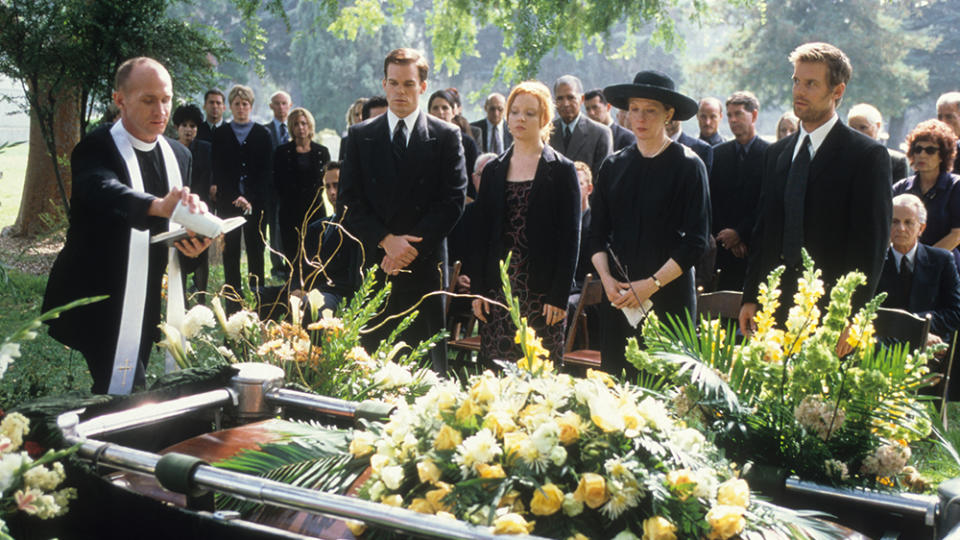Bob Greenblatt Turns His ‘Gift of Free Time’ into Memoir of Producing, Programming and Persevering
- Oops!Something went wrong.Please try again later.

Bob Greenblatt’s rollercoaster ride as an executive over the past four years is a perfect illustration of the speed and magnitude of industry disruption.
The longtime executive left his post as NBC Entertainment chairman in September 2018 after seven solid years. He joined up with AT&T’s WarnerMedia as head of HBO and Direct-to-Consumer in March 2019, but 17 months later got pushed out of that role in a massive shakeup. In January, he celebrated the launch of “The Gilded Age,” the costume drama series that he produced for HBO, which has a new owner in Warner Bros. Discovery since Greenblatt last worked there in 2020.
More from Variety
Bob Greenblatt Explains the 12-Year Journey to Bring 'The Gilded Age' to TV
'Six Feet Under' Follow-Up in Early Development at HBO (EXCLUSIVE)
Bob Greenblatt Launches New Production Company, Seals First-Look Deal With Lionsgate (EXCLUSIVE)
Greenblatt has not been idle since he was given “the gift of free time” from WarnerMedia in the second half of 2020, as he quips in an interview with Variety. He seized the moment to reflect in a significant way on his more than 30 years in the entertainment industry. The result is a memoir, “The Rockford Files: Epiphanies in Show Business,” that the former Showtime and Fox Broadcasting Co. executive wrote on his own.
He has self-published a number of hardback copies to share with friends and longtime colleagues. But he’s also discussing a broader publishing pact with a number of potential buyers.
After years of working with accomplished writers to develop TV shows, Greenblatt says it was humbling and invigorating to face the blank page every day.
“It was about a year of me pouring out the stories on the page, and another four to five months reworking it,” Greenblatt says. “So many things about writing it were revelatory to me. So many little things.”
The title refers to Greenblatt’s hometown of Rockford, Ill., about 90 miles west of Chicago, and the detective drama series starring James Garner that ran on NBC from 1974-80.
Taking a long look in the rearview mirror helped him take stock of where the industry is headed. And that was a worthy exercise for an executive who is pursuing entrepreneurial ventures in TV, stage and other content opportunities.
“When you step back for a minute and really think about things, it’s really remarkable to look at what’s happened to the business,” Greenblatt says. “When I started there were basically three networks and Fox was on a couple nights a week. Then we went into the cable revolution and now it’s streaming that is the next iteration.”
From the days of vaudeville and nickelodeons to the burgeoning world of Web3 entertainment, the one constant throughout is the need for distinctive content to bring consumers to the screen. Greenblatt’s book is an invaluable compendium of anecdotes about his experiences in the TV trenches. He brings the dual perspective of a seasoned industryite who has worked as a top programming buyer for major networks as well as a producer of Emmy-winning series.
Some of the liveliest tales in the tome revolve around “Six Feet Under,” the beloved HBO drama series that ran from 2001 to 2005. Greenblatt and his former producing partner, David Janollari, shepherded the series with creator Alan Ball through the Greenblatt Janollari Studio banner that the pair ran in the late 1990s and early 2000s.
On paper, a show about a deeply dysfunctional family that runs a funeral home in Pasadena hardly has the makings of a successful TV series. But in the moment that “Six Feet Under” was birthed some 20-odd years ago, HBO was just starting to open the aperture of prestige television.
“The Rockford Files” also makes crystal clear how much television is a team sport. Greenblatt goes out of his way to recognize the many people who contributed the ideas and inspirations that make for distinctive shows.

Courtesy of HBO
The germ of the idea for “Six Feet Under” came from then- HBO development chief Carolyn Strauss being interested in finding a series set against the backdrop of the business of death. At the same time, “Six Feet Under” only worked because Ball brought his unique view to the subject matter.
“Alan Ball is a singular talent, and recognizing that early on was a stroke of luck for us. We had an instinct about him. And while instincts are hard to quantify, if you learn to listen to them and trust your gut about a ‘feeling’ you have, it can pay big dividends,” Greenblatt writes. “This show always goes back to one of my favorite epiphanies — only pursue ideas that are singular, totally original and even risky. While it’s not possible to do that every single time, when you can, the payoff is often extraordinary. In a million years, the idea of a show set in a funeral home doesn’t make any sense, until it gets into the hands of a genius.”
Of course, in the stranger-than-fiction way the world works, Greenblatt was head of programming for HBO rival Showtime by the time “Six Feet Under” wrapped its five-season run in 2005.
Other series discussed in detail include “Weeds,” the offbeat comedy that set the tone for Greenblatt’s tenure as Showtime entertainment chief; “The X-Files,” a big hit during Greenblatt’s stint at Fox that pointed the way to the global drama blockbusters of the present day; and “The Gilded Age,” the Christine Baranski-Carrie Coon starrer from “Downton Abbey” creator Julian Fellowes that Greenblatt nurtured at NBC and Showtime before finally getting it made (amid the real-life drama of COVID) nearly a decade later. He also offers revealing details about the process of developing, financing and producing a stage musical from his years-long journey bringing “9 to 5: The Musical” in 2008 to Los Angeles and then a brief Broadway run in 2009.
In weighing his hits and misses, Greenblatt concludes that the toughest assignment in all of showbiz is to sell an original idea.
“The process of writing the book gave me endless admiration for all the producers who have brought me ideas over the years,” Greenblatt says. “Producing is hard. It’s really difficult to convince somebody else to get on board with your idea and then stay with it to go the distance to get it made.”
As the industry regroups coming out of the crush of pandemic conditions, Greenblatt is glad he took the time for a retrospective career review.
“It was a good thing to be doing as everything was slowing down during COVID,” Greenblatt says. “Like me, a lot of people in the business got very reflective. I think that’s a good thing.”
Best of Variety
From 'The Sandman' to 'Blonde': Books Made Into Movies and TV Series That You Should Read
Jennette McCurdy's Provocative Book 'I'm Glad My Mom Died' Is Already a No. 1 Bestseller
Sign up for Variety’s Newsletter. For the latest news, follow us on Facebook, Twitter, and Instagram.

